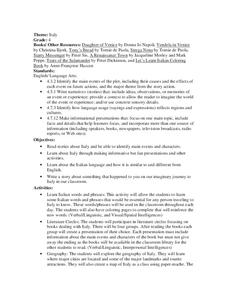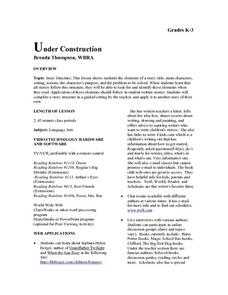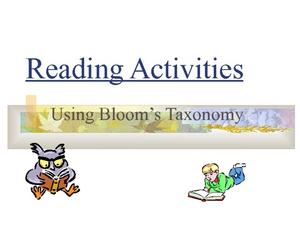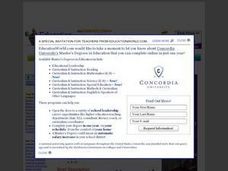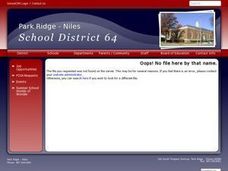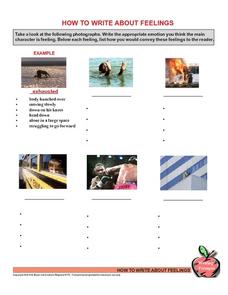Curated OER
Italy
Learners read stories about Italy and identify main events and characters. They take an imaginary trip to Italy and write a story about their adventures. In addition, they practice several italian words and phrases.
Curated OER
Focus Story: The Mitten
Students explore language arts by analyzing a story with their classmates. In this poetry identification lesson, students read the book The Mittens and identify the characters, plot and settings in the story. Students recite poems about...
Curated OER
Dear Character
Third graders examine and better explain a character and their traits by writing a letter from their point of view.
Curated OER
Biography Chat
Students profile a mock television talk-show format to conduct mock interviews with famous people in history. Students read biographies of famous people in history. Students assemble questions for interviews.
Curated OER
Under Construction
Young readers examine the elements of story structure that are included in all stories. They include these elements in their own written pieces. This phenomenally-designed plan has everything you need to easily implement it in your...
Curated OER
Card Catalog Cards
Prepare students on how to use the library's card catalog system as well as the online version. Author, card catalog, the Dewey system, and so much more is addressed. This would be a great tool to use in the classroom or library.
Curated OER
What’s your Name?
Youngsters work to build empathy, cultural understanding, and a sense of self as they uncover the story behind their own names. They read the book, The Name Jar, discuss immigration and how it feels to be in a new place. Then, they...
Dorling Kindersley
Punctuation Practice
Need some punctuation practice? Challenge your third or fourth graders' editing skills with a helpful instructional activity on punctuation. After naming different types of punctuation marks, they rewrite a paragraph that has multiple...
Curated OER
Reading Activities Using Bloom's Taxonomy
This short, yet effective, presentation gives pupils many great tips on increasing their enjoyment of what they read and improving their comprehension. The categories of tips include analyzing, remembering, understanding, applying,...
Curated OER
Nonfiction Genre Mini-Unit: Persuasive Writing
Should primary graders have their own computers? Should animals be kept in captivity? Young writers learn how to develop and support a claim in this short unit on persuasive writing.
Curated OER
Julian Secret Agent: Commas
Your class participates in a variety of shared reading and writing activities related to the book Julian Secret Agent. They complete a class story chart, examine how to use punctuation for dialogue, write an alternative...
Curated OER
A Fine Feathered Flock
Students role play different situations. In this respect lesson, students read Mr. Lincoln's Way, identify the story elements and answer comprehension questions. Students discuss how they can always treat others with respect and role...
Museum of Disability
Taking Visual Impairment to School
What is the world like when you can't see, or when your vision is impaired? Learn about how Lisa communicates with the world around her with Taking Visual Impairment to School by Rita Whitman Steingold. Learners answer...
K12 Reader
Narrator and Point of View
Point of view is important when choosing a narrator. Help young writers distinguish between first and third person point of view with an activity that features excerpts from Robert Louis Stevenson's Treasure Island. After reading...
Museum of Disability
Stand in My Shoes
Stand in My Shoes, a story by Bob Sornson, is an effective way to teach young learners about empathy and making friends. Once pupils read through the story, they answer a series of discussion questions and complete reading...
United K12
Jan Brett Author Study
Expose young children to the wonderful works of author and illustrator Jan Brett using a few of her stories such as Armadillo Rodeo, The Mitten, or Daisy Comes Home through a unit study.
Curated OER
Act it Out: Dramatizing Asian American Stories
Read and act out folktales, fairy tales, or myths from various Asian American cultures with your class. Each group reads a story aloud and then works together to create a short play or skit about the story. Suggestions for stories are...
Curated OER
Those Fabulous Fables
A video leads off this activity on fables, introducing the class to this important form of traditional storytelling. The group defines fable and hears an explanation of the origin of this type of folk tale. They summarize the story they...
Curated OER
Reciprocal Reading
The strategies associated with Reciprocal Reading are outlined in this language arts presentation. Pupils discover what it means to be the questioner, the summarizer, the predictor, and the clarifier. All four strategies lead to...
Pimsleur
Book Report
Discover Italian families though a book study. Learners also practice Italian vocabulary and grammar, explore direct and reported speech, and complete an assessment or final project.
Novelinks
The Wednesday Wars: Calendar Timeline
Here's a calendar that helps readers keep track of the major events in The Wednesday War.
Curated OER
An Author Report on Beverly Cleary
Students examine Beverly Cleary as a reader and an author. They write a letter to Beverly Cleary that details their personal journey as readers and writers after reading her work and keeping a reading journal.
Curated OER
Stringbean Coes Vacation
Third graders first begin the activity by reading Vera B. Williams Stringbean's Trip to the Shining Sea. This book is a collection of postcards that Stringbean Coe and his brother Fred write to their family while they were on a summer...
Curated OER
How to Write About Feelings
This worksheet presents a clever way to help students practice writing about feelings. In it, six photographs are shown. Below the photos are a line for a feeling word, then some bullet points to write phrases which match what the person...
Other popular searches
- Setting Plot Main Characters
- Identify Main Characters
- Main Characters and Setting
- Main Character and Setting
- Identifying Main Characters
- Describing Main Characters
- Main Character Study
- Main Character Kindergarten
- Explaining Main Characters
- Defining Main Characters
- Developing a Main Character
- Reading for Main Character
